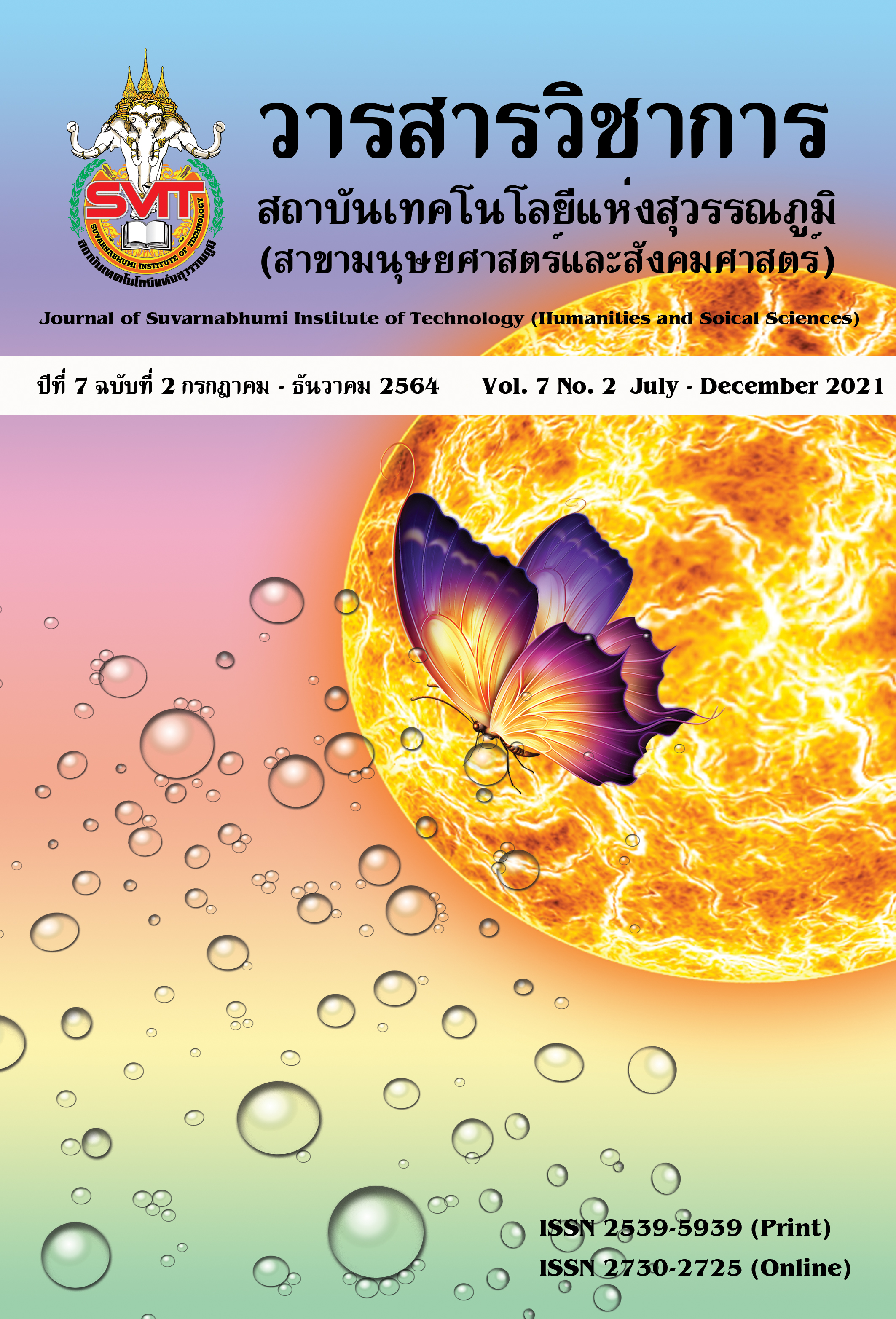THE ENHANCEMENT OF SECONDARY STUDENTS’ CAREER DECISION MAKING THROUGH INTEGRATIVE GROUP COUNSELING MODEL
Keywords:
Integrative group counseling, Career decision making, Secondary studentsAbstract
The purposes of this study were 1) to study of secondary student’s career decision making. 2) to develop an integrative group counseling model for enhancement of career decision making, and 3) to evaluate the effectiveness of the integrative group counseling model for the enhancement of career decision making. The research was divided into 2 steps: step 1, to study the career decision making, consist of 1,000 secondary students, region of Thailand. The research instruments were a career decision making scale. Step 2, to develop and study the results of using the integrative group counseling model. The sample group of this study was 20 secondary students, whose career decision making average level score down. They were randomly assigned into two groups, classified as an experiment group and control group, each group consisted of 10 persons. Statistics were analyzed using repeated measures.
Research results can be summarized as follows:
- 1. The secondary student’s career decision making in Thailand were at a high level (
= 3.57, SD = 0.62) but in the northeastern were at a moderate level (
= 3.46, SD = 0.58). When considering each element, it was found that the Comfort and Decidedness were at a high level (
= 3.71, S.D. = 0.68 and
= 3.57, S.D. = 0.74 respectively) but it was found that the Reasons were at a moderate level (
= 3.42, SD = 0.73)
- The integrative group counseling model for enhancing of career decision making was developed from the concepts and techniques of group counseling theories. These group counseling theories were Cognitive behavioral group counseling, Person-centred group counseling, Rational emotive behavior therapy, Solution-focused brief therapy, Behavior group counseling and Reality group counseling. This model included initial stage, working stage, and termination stage.
- The results of integrative group counseling model for enhancing of career decision making found that
3.1 The career decision of students in the experimental group post-test and follow-up was better than the control group with statistical significance at .05 level.
3.2 The career decision of students in the experimental group post-test and follow-up was better than pre-test with statistical significance at .05 level.
References
กงศรี จุนละมานี. (2545). ผลของการใช้โปรแกรมแนะแนวอาชีพที่มีต่อการเลือกอาชีพของนักเรียนชั้นมัธยมศึกษาปีที่ 6 โรงเรียนมัธยมสมบูรณ์สาธิต มหาวิทยาลัยแห่งชาติลาว (วิทยานิพนธ์ปริญญามหาบัณฑิต). มหาวิทยาลัยบูรพา.
กาญจนา ณ ลำพูน. (2538). ผลของการปรึกษาเชิงจิตวิทยาทางอาชีพแบบกลุ่มตามแนวคิดแบบวิเคราะห์ลักษณะและปัจจัยส่วนบุคคล (วิทยานิพนธ์ปริญญมหาบัณฑิต). จุฬาลงกรณ์มหาวิทยาลัย.
ขวัญกมล ดอนขวา, และจิตตานันท์ ติกุล. (2555). การพัฒนาคุณภาพการท่องเที่ยวเชิงเกษตรในภาคตะวันออกเฉียงเหนือ (รายงานการวิจัย). นครราชสีมา: คลังปัญญา มหาวิทยาลัยเทคโนโลยีสุรนารี.
นิปัทม์ พิชญโยธิน. (2551). โมเดลการวัดโปรไฟล์การตัดสินใจเลือกอาชีพและผลต่อพัฒนาการทางอาชีพของผู้ใหญ่ตอนต้น: การพัฒนาและการตรวจสอบความตรงของโมเดลแข่งขัน (วิทยานิพนธ์ปริญญามหาบัณฑิต). จุฬาลงกรณ์มหาวิทยาลัย.
นีรนุช เทพหัสดิน ณ อยุธยา. (2542). การศึกษาความสัมพันธ์ของการรับรู้ความสามารถของตนและภาวะอำนาจภายใน – ภายนอกที่มีต่อการตัดสินใจเลือกอาชีพที่เป็นและไม่เป็นวัฒนธรรมทางอาชีพตามเพศของนักศึกษาระดับอุดมศึกษา (วิทยานิพนธ์ปริญญามหาบัณฑิต). มหาวิทยาลัยรามคาแหง.
ปวีณา ยอดสิน. (2551). ผลของการใช้โปรแกรมการแนะแนวการศึกษาและอาชีพตามทฤษฎีการตัดสินใจของเกแลตต์ ต่อการพัฒนาการตัดสินใจเลือกศึกษาต่อและอาชีพของนักเรียนชั้นมัธยมศึกษาปีที่ 3 โรงเรียนวัดไร่ขิงวิทยา จังหวัดนครปฐม (วิทยานิพนธ์ปริญญามหาบัณฑิต). มหาวิทยาลัยเกษตรศาสตร์.
วัชรี ทรัพย์มี. (2554). ทฤษฎีให้บริการปรึกษา (พิมพ์ครั้งที่ 6). กรุงเทพฯ: โรงพิมพ์แห่งจุฬาลงกรณ์ มหาวิทยาลัย.
สมร ทองดี. (2555). การแนะแนวกับคุณภาพชีวิต (พิมพ์ครั้งที่ 9). นนทบุรี: สำนักพิมพ์มหาวิทยาลัยสุโขทัย ธรรมาธิราช.
เสาวลักษณ์ โรจน์สุธี. (2557). ปัจจัยของการไม่สามารถตัดสินใจเลือกอาชีพได้: กรณีศึกษานักเรียนชั้นมัธยม ศึกษาตอนปลาย จังหวัดระยอง (วิทยานิพนธ์ปริญญามหาบัณฑิต). สถาบันแห่งชาติเพื่อการพัฒนาเด็กและครอบครัว มหาวิทยาลัยมหิดล.
อรพินทร์ ชูชม, อัจฉรา สุขารมณ์, และทัศนา ทองภักดี. (2540). การวิเคราะห์ปัจจัยที่เกี่ยวข้องกับการตัดสินใจทางการศึกษา-อาชีพของนักเรียนระดับมัธยมศึกษาตอนปลาย (รายงานการวิจัย). กรุงเทพฯ:สถาบันวิจัยพฤติกรรมศาสตร์, มหาวิทยาลัยศรีนครินทรวิโรฒ ประสานมิตร.
Comrey, A.L., & Lee, H.B. (1992). A First Course in Factor Analysis (2nd ed.). Hillsdale, NJ: Erlbaum.
Corey, G. (2012). Theory and practice of group counseling (8th ed.). Belmont, CA: Brooks/Cole, Cengage Learning.
Holland, J. L. (1997). Making Vocational Choices: A Theory of Careers. Englewood Cliffs, NJ: Prentice Hall.
Jones, L. K. (1989). Measuring a three-dimensional construct of career indecision among college students: A revision of the Vocational Decision Scale: The Career Decision Profile. Journal of Counseling Psychology, 36(4), 477-486.
Jones, L. K., & Chenery, M. F. (1980). Multiple subtypes among vocationally undecided college students: A model and assessment instrument. Journal of Counseling Psychology, 27(5), 469-477.
Patton, W., & Creed, P. A. (2001). Developmental issues in career maturity and career decision status. The Career Development Quarterly, 49(4), 336-351.
Sampson, J. P., Jr., Reardon, R. C., Peterson, G. W., & Lenz, J. G. (2004). Career counseling and services: A cognitive information processing approach. Pacific Grove, CA: Brooks/Cole.
Super, D. E. (1953). A theory of vocational development. American psychologist, 8(5),185.
Super, D. E. (1994). A Life Span, Life Space Perspective on Convergence. In M. L. Savikas & R. W. Lent (Eds.), Convergence in Career Development Theories: Implications for Science and Practice. (pp. 63-74).Palo Alto: CPP.
Tabachnick, B. G., Fidell, L. S., & Osterlind, S. J. (2001). Using multivariate statistics. New York: Pearsons.
Downloads
Published
Issue
Section
License
The articles published are copyrighted by the Sarasas Journal of Humanities and Social Science. The opinions expressed in each article in this academic journal are those of the individual authors and do not reflect the views of Sarasas Suvarnabhumi Institute of Technology. The authors are solely responsible for all aspects of their respective articles. Any errors or inaccuracies in the articles are the sole responsibility of the authors.



